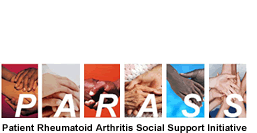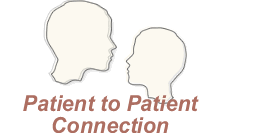Patient-to-Patient Connection Program
Helping fellow patients feel more hopeful, less alone, and more positive about life.

History: In October 2006, Brigham and Women’s Hospital’s Arthritis Center ran focus groups with RA patients. One major finding was that patients would have wished to talk with an experienced patient when they were first diagnosed. When newly diagnosed, patients often envision a life bound to a wheel chair and isolated from others. They are confused about what to ask their doctors and in limbo for months trying different medications to find one that is effective. It was due to this patient request that Brigham and Women’s Hosptial’s Rheumatology Department initiated the Patient-to-Patient Connection program with funding from AMGEN. Rheumatoid Arthritis Research has shown that, while patients’ response to different medications may vary, generally:
- Fatigue and physical disability lead to a loss of independence, lower self-efficacy, anxiety and depression which in turn affects interpersonal relationships
- Social support (advice, emotional support, guidance) relates strongly to emotional well-being among those with chronic illness
- Statistics from the Brigham Rheumatoid Arthritis Sequential Study (BRASS), a prospective study of patients with RA, confirm that RA patients have lower disease activity and do better overall if they have social support (2008)
Buddy systems matching patients with similar needs or interests have been successful in addiction rehabilitation and oncology treatment, and group sessions have long been used as teaching and support tools in diabetes management. Rheumatoid Arthritis, an ongoing chronic and sometimes disabling disease, can benefit from increased social systems such as patient-to-patient support.
The Patient-to-Patient Connection Program provides
- Someone to turn to for support outside of the clinic visit – RA is a 24/7 illness
- Personal contact that can lessen anxiety, create positive thinking, and improve self-management
- Social support that enhances adherence to treatment regimens, rehabilitation, and improves overall health outcomes
- A vision that things can be different in the future -a more productive life
- A meaningful relationship for both the Peer Support Partner and Patient Partner


